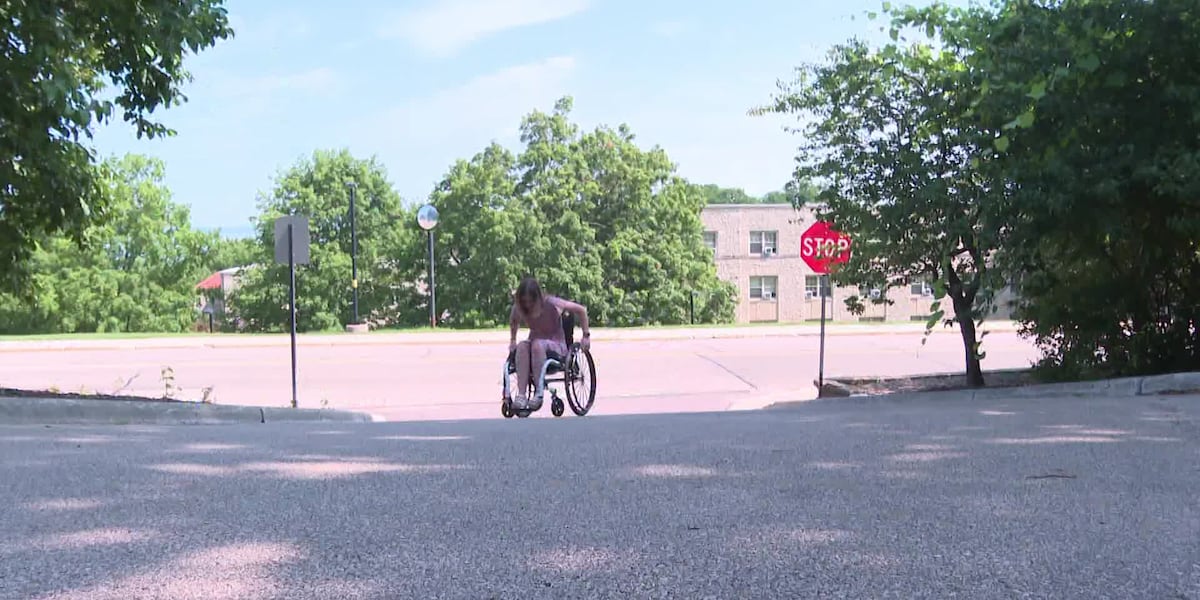MADISON, Wis. (WMTV) – Brelynn Billie is no stranger to uphill battles. On a muggy summer morning, she literally pushes her wheels up her driveway, trying to catch her breath as she jokes about going to the gym. As she nears the top, her wheels tip back, but she quickly regains her balance and keeps going.
Finally reaching the top and wiping her forehead as she took a sharp breath, she exclaimed, “I did it! What’s my time?”
Add to that the heavy backpacks, ice, and fatigue of a full-day schedule, and the climb up the hill to get to grad school becomes a monumental task, Billy explains, which is one of the reasons why Billy, a graduate student at the University of Wisconsin-Madison, has never been inside his own graduate school building.
“The only way you can actually access this space is by climbing a very steep hill,” Billy said.
Even if she were to make it to the top of the hill and get into the La Follette School of Public Policy, Billie said there would be another hurdle: All of her professors’ offices are on the second and third floors of the building.
“There’s no elevator here, so I can’t get to the professor’s office.”
This isn’t the first place Billie has trouble accessing, and it won’t be the last, which is part of what inspired her to act as an advocate.
Billy, who was just 19 at the time, contacted Wisconsin Governor Tony Evers to ask for his help in recognizing the people we often see but don’t hear about.
“When you have a disability, advocacy becomes a part of your life,” Billy says.
Billy requested a proclamation declaring July Disability Awareness Month in the state of Wisconsin, and for the past three years, it has been a month to celebrate community and fight for a better future.
“It’s okay to say the word ‘disabled,'” Billy says, “and I think everyone needs to be aware of that at some point in their life, whether it’s because of a chronic illness or because they slipped on ice and fell during a lovely Wisconsin winter.”
Billy uses a wheelchair that he named “Tessie” after Tesla, known for its shiny spokes.
“I have a condition that makes it very difficult for me to walk long distances,” Billy says. “I end up just being so tired.”
“The University of Wisconsin-Madison is committed to making the campus experience accessible and inclusive for all, and both the University of Wisconsin-Madison and La Follette are aware of the accessibility needs for this building,” University of Wisconsin-Madison spokesman John Lucas said in a statement.
Billie confirmed that the university had contacted her about possible solutions.
“Some of the options are very costly, which is a typical problem we face when renovating a lot of buildings,” Billy says. “Is it too expensive to fix, or are we only going to be here for a short time, is it worth the time it would take to make it accessible?”
The school’s statement continues: “Some of the university’s buildings predate accessibility laws, are registered on state or national historic landmarks, and are located in challenging terrain. La Follette School’s Observatory Drive office building is one example.”
“It’s really, really sad and it reminds me that there’s a place for me here,” Billy said.
For now, access is the number one priority for the 22-year-old in her work.
“If we aren’t accepted by society, everyone loses,” Billy says, “whether it’s a funny joke when you’re in a wheelchair, or the lessons they can learn from us as individuals, or how we view the world.”
Click here to download the WMTV15 News App or the WMTV15 First Alert Weather App.
Copyright 2024 WMTV. All rights reserved.

